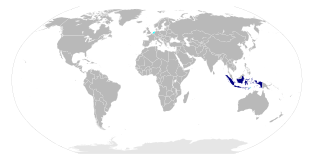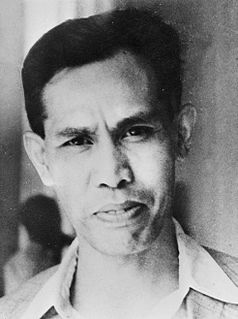
Elections in Indonesia have taken place since 1955 to elect a legislature. At a national level, Indonesian people did not elect a head of state – the president – until 2004. Since then, the president is elected for a five-year term, as are the 575-member People's Representative Council, the 136-seat Regional Representative Council, in addition to provincial and municipal legislative councils.

The Socialist Party of Indonesia was a political party in Indonesia from 1948 until 1960, when it was banned by President Sukarno.

The Indonesian National Party is the name used by several political parties in Indonesia from 1927 until the present day.

The National Mandate Party, frequently abbreviated to PAN, is an Islam-based political party in Indonesia.

The Crescent Star Party is a political party in Indonesia.
The Indonesian Justice and Unity Party is a political party in Indonesia.
The Indonesian Democratic Vanguard Party was a political party in Indonesia. It was a continuation of the Indonesian Democratic Party (PDI), one of the two state-approved parties during the New Order. After the PDI failed to achieve enough votes in the 1999 legislative elections to qualify for the 2004 elections, it changed its name to the Indonesian Democratic Vanguard Party In 2004 it won one seat. The party contested the 2009 legislative election, but won only 0.13 percent of the vote, less than the 2.5 percent electoral threshold, thereby losing its only seat in the People's Representative Council. Following its poor result in the 2009 vote, the party joined nine other smaller parties to form the National Unity Party. The party also attempted to contest the 2014 elections, but failed to fulfill the criteria set by the General Elections Commission, and along with nine other parties who also failed to qualify, decided to merge into the People's Conscience Party (Hanura).
The Masyumi Party was a major Islamic political party in Indonesia during the Liberal Democracy Era in Indonesia. It was banned in 1960 by President Sukarno for supporting the PRRI rebellion.

Indonesia's first parliamentary general election was held on 29 September 1955. The candidates were seeking to be elected to the 257-seat People's Representative Council, which would replace the existing provisional legislature. Despite hopes that the election would bring about political stability, the legislature elected only lasted four years before being dissolved by presidential decree.

Indonesia's second legislative election, and the first under the New Order regime, was held on 3 July 1971. There were 10 participants; 9 political parties and the "functional group" Golkar.

Indonesia's third legislative election, and the second under the New Order regime, was held on 2 May 1977. There were three participants; the two political parties and functional groups Golkar.

Indonesia's fourth legislative election, and the third under the New Order regime, was held on 4 May 1982. There were three participants; the two political parties and the "functional group" Golkar.

Indonesia's fifth legislative election, and the fourth under the New Order government, was held on 23 April 1987. There were three participants; the two political parties and the "functional group" Golkar. Like all the New Order elections, it was an outright victory for Golkar.

Indonesia's sixth legislative election, and the fifth under the New Order regime, was held on 9 June 1992. Although the share of the vote won by Golkar declined, and the two parties saw their votes rise, the government organisation still won a clear majority.

The 1999 Indonesian legislative election, held on 7 June 1999, was the first election since the end of the New Order and the first free election in Indonesia since 1955. With the ending of restrictions on political activity following the fall of Suharto, a total of 48 parties contested the 462 seats up for election in the People's Representative Council. A further 38 seats were reserved for the armed forces.

Islamic Association Party of Indonesia was an Islamic political party in Indonesia. In 1973 it was merged into the United Development Party.

The Wilopo Cabinet was an Indonesian cabinet that served from 1 April 1952 until 3 June 1953.

The Djuanda Cabinet, or "Working Cabinet" was an Indonesian cabinet that served from 9 April 1957 until 5 July 1959, when it was dissolved by a decree from President Sukarno.

Murba Party was a 'national communist' political party in Indonesia. The party was founded by Tan Malaka, Chairul Saleh, Sukarni and Adam Malik in 1948. The history of the party was largely intertwined with that of the powerful Communist Party of Indonesia (PKI). Initially relations between PKI and the Murba Party were fluid, but gradually the two parties developed into each other's arch-enemies. The Murba Party continued to exist under the New Order, but was merged into the Indonesian Democratic Party in 1973.

Melani Leimena Suharli is an Indonesian politician from the Democratic Party who has been a member of the People's Representative Council since 2009. Between 2009 and 2014, she served as the deputy speaker of the People's Consultative Assembly.













